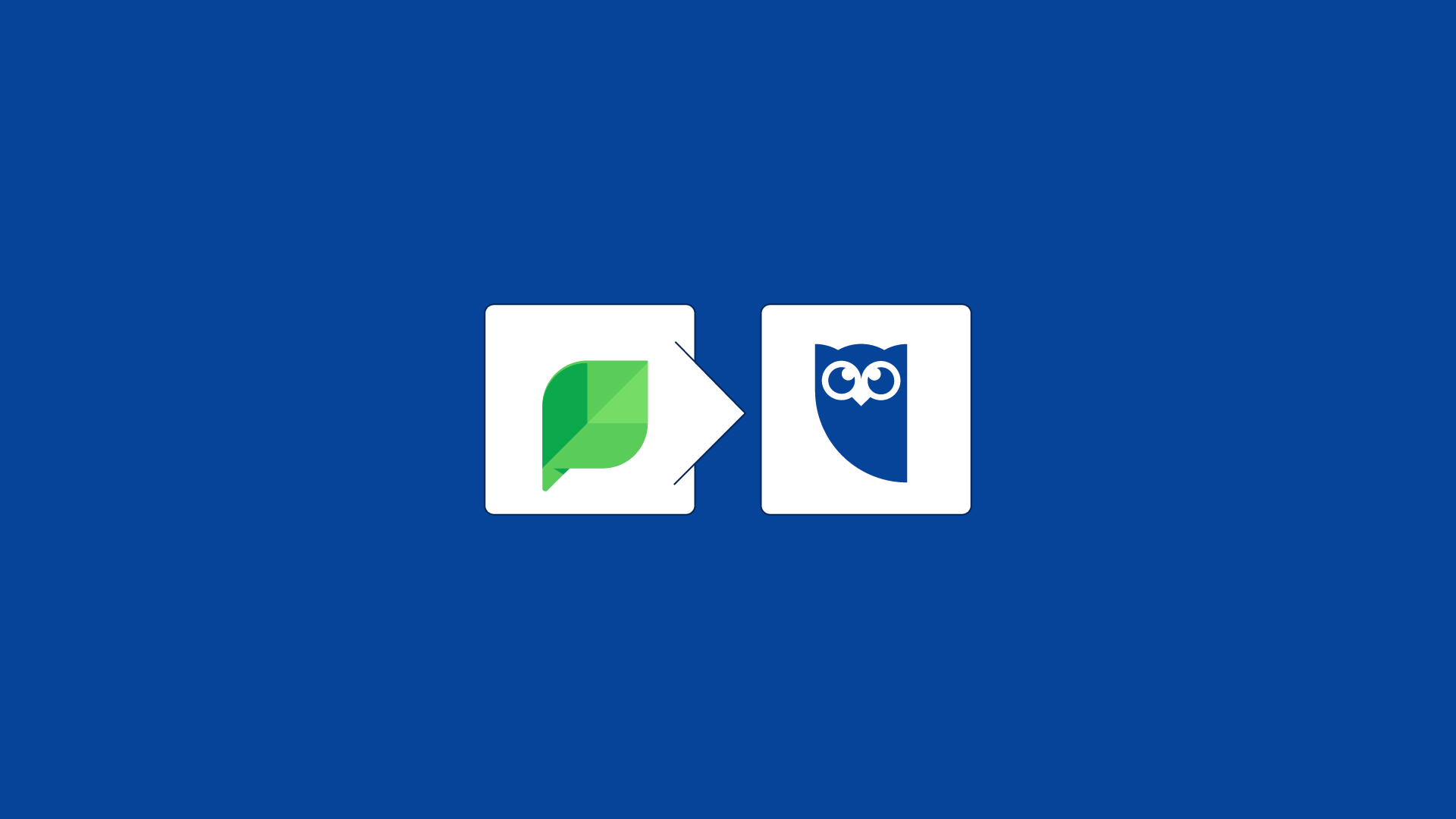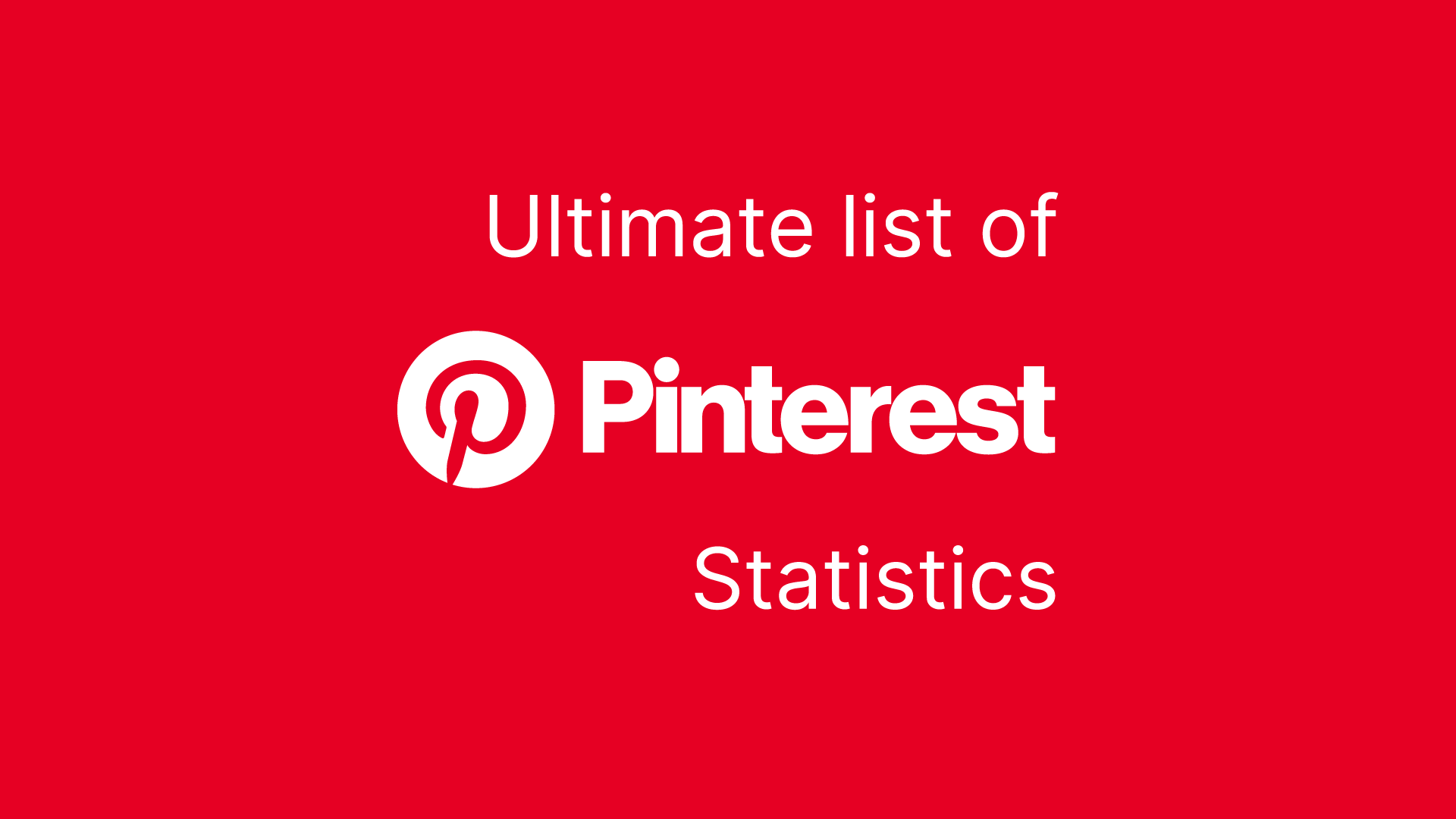|
Getting your Trinity Audio player ready...
|
Social media management platforms are an essential part of any successful marketing strategy. With the right tool, social media professionals can quickly create, monitor, and track posts across numerous channels while gaining valuable insights into how customers interact with their brands. It’s also important to consider the total cost of ownership when selecting a platform. The best tools offer free trials or low start-up costs so that businesses can determine whether or not they’re worth investing in.
Social media is a powerful tool for both individuals and businesses, used to not only reach out to peers but also increase awareness. As of 2023, there are over 4.89 billion social media users globally according to Sprout Social. This means that businesses have more and more opportunities than ever before to connect with potential customers. To do this with ease businesses need the right social media management tools.

Before committing to a social media platform, it’s important to know exactly what features you need for your business: automation tools to save time on routine tasks and monitoring capabilities to keep tabs on competitors and industry trends.
You should also look for flexible analytics solutions that allow you to measure ROI and growth over time so that you can adjust your strategies as needed. Finally, always make sure to choose a platform with reliable customer service so you can get help if something isn’t working properly or if you have any technical questions.
It can be difficult for businesses to identify the best social media management tool, especially with the countless options available online. Each tool offers different features and functionalities, so business owners need to assess what their needs are to make a well-informed decision.
In this post, we explore the steps you can take to ensure you choose the best social media marketing tool for you.
What are Social Media Management Tools?
Social media management tools are a powerful asset to businesses and organizations of all sizes. Automating communication and scheduling posts from a single dashboard enables social media managers to efficiently engage with their audiences on various platforms. By analyzing gathered metrics, they can monitor campaign performance and make strategic adjustments for improved return on investment.
More so, social media management tools provide actionable insights from detailed analytics about user engagement. This data includes demographics, which allow users to understand who is engaging with their content; helpful when wanting to expand your reach. With competitive analysis to compare performance against industry peers, users can gauge the success of their efforts with others in the same field.
Smart scheduling ensures that posts are reaching followers at optimal times for higher visibility and engagement. Social media management tools put further control, convenience, and insights into the hands of digital marketers around the world – helping them develop better strategies with greater efficiency.
Why use Social Media Management Tools for your Businesses
Social media management tools are essential for businesses in every industry today since social media has become a powerful communication platform. With these tools, businesses can easily track conversations about their brand and respond to customers in real time.
Companies can also use these tools to schedule posts in advance so they don’t have to worry about missing an important post due to being away from the computer or without access to the internet for a short period. This way, brands can ensure that they are regularly promoting content and staying active on the most popular social networks.
Social media management tools also provide companies with useful data and insights that they can use to improve their marketing strategy and better understand how users engage with their brand. For example, you can track engagement rates, comments, shares, likes, followers, and much more with these tools.
It’s easier for companies to launch new social media campaigns if they use social media management software. This is because it allows them to capture more attention by targeting specific people within their target market.
Using such tools gives businesses a great advantage as it enables them to create unique relationships with customers while effectively engaging in conversations surrounding their business on social media.
By utilizing consistent engagement, targeted advertising, and retargeting strategies, your brand can remain at the forefront of the minds of individuals who are making purchasing decisions. Regardless of your professional field, a top-tier social media management tool is essential for effective digital marketing.
Although social media can bring numerous advantages to your business, certain difficulties come with it. Social media marketing encompasses various tasks such as content creation, customer engagement, data analysis, reporting, and measuring return on investment. Various social media platforms exist today. It is common for businesses to have a presence on multiple platforms, sometimes exceeding five.
The manual management of various social network processes can be both complex and time-consuming.
How do you find the best social media management tool for your business?
1. Start by defining your social media goals
Before you start looking for a social media management tool, you need to clearly define your goals and objectives.
- What do you want to achieve through social media?
- Do you want to build relationships with customers, generate leads, or increase brand awareness?
- What do need a social media tool to help you with?
- Do you need one?
Use the SMART goals goal-setting model when you set your social media goals. Set goals that are specific, measurable, attainable, relevant, and time-bound. Use this template from Fine Media to set your SMART goals.
Identifying your goals can assist in the process of selecting appropriate tools for social media management.
Before you start looking for a social media management tool, it’s crucial to clearly define your goals and objectives. This step helps you understand what you want to achieve through social media and guides your tool selection process.
For example, you may aim to build relationships with customers, generate leads, increase brand awareness, or drive website traffic. Specify how many leads you want to generate at what time. By identifying your specific objectives, you can narrow down the list of potential tools that align with your goals.
2. Decide on your must-have features
To create a successful social media marketing strategy, you need to identify your must-have features in a management tool. Consider which features will help you meet the objectives you set in your social media goals. While many marketing tools offer similar features, it’s important to focus on the ones that are essential for your specific goals.
During this process, involve key members of your team and gather their input on which features they need. By considering different perspectives, you can ensure that no crucial features are overlooked. Also, break down the activities required for each goal into smaller tasks that can be accomplished using specific tools or features. Once you’ve identified these tasks, you can explore different software programs and assess whether they include the must-have features you need to reach your goals.
While features may be useful for future campaigns, prioritize identifying all the essential features necessary for executing your strategy effectively right now. Keeping these details in mind will help ensure long-term success with your social media marketing efforts.
I cover this in detail further down the blog to give you a much clearer picture of the feature to look for in a social media platform depending on what you would like to achieve.
3. Do research to find the best platform options
When searching for the best social media management tool for your needs, conducting research is crucial. Start by clarifying your goals and listing out the must-have features you identified in the previous steps. To find relevant options, use keywords such as “best social media marketing tools,” “top social media management tools,” “social media management software,” and “top social media tools” in your online search.
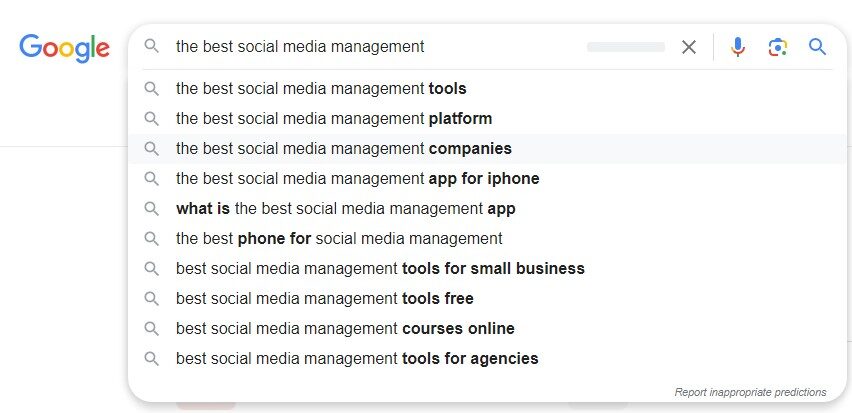
You can also leverage search engines like Google and platforms like YouTube to gather more information on different solutions. Reading reviews and comparisons between various tools can provide insights into how well each option works. It’s important to allocate enough time to thoroughly investigate these platforms before making any decisions. We have compared some of the best social media marketing platforms also to make choosing easier for you, make sure to check the article out.
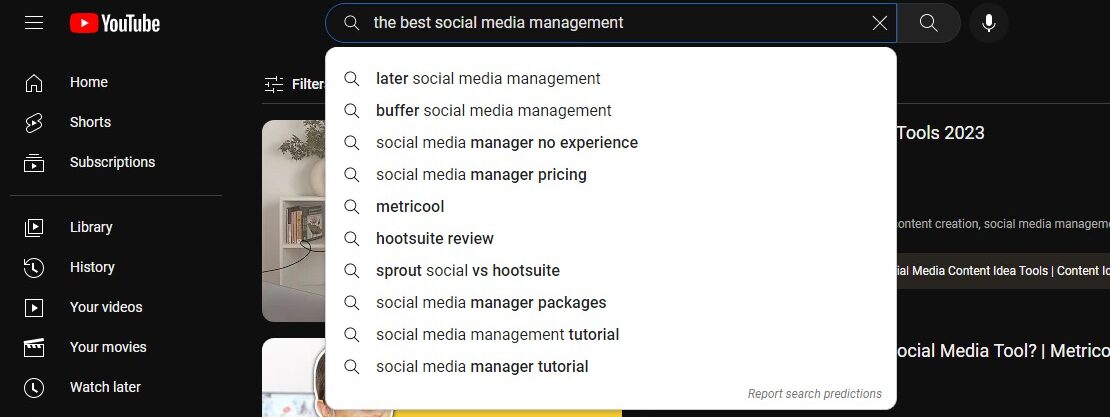
Note that some community platforms like Quora, and Reddit can also help you get more insight from the users of the platforms. Some Facebook groups focused on content marketing have social media managers who share ideas on the best course of action in social media marketing with the ever-changing trends. Use these groups, and ask questions regarding the best social media marketing tools.
By conducting thorough research, you can ensure that you find a tool that not only meets your individual needs but also integrates seamlessly with your current workflow and budget.
4. Create your shortlist of social media tools
In the realm of social media marketing, numerous tools offer a wide range of benefits and features. To have a successful social media campaign, selecting the right tool is essential.
Below is a list of several top tools with brief descriptions of their features:
1. Sprout Social
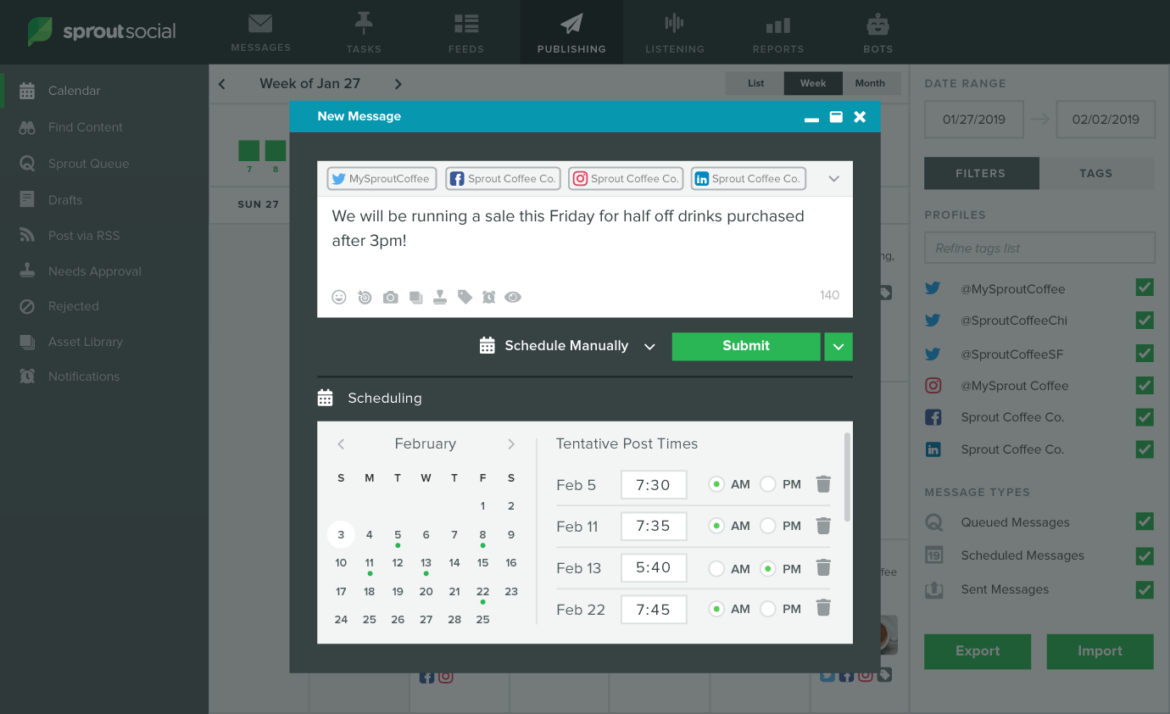
Sprout Social is a robust social media management tool that offers features like scheduling and publishing posts, monitoring brand mentions, managing social media interactions, and analyzing performance. It provides in-depth reporting, audience targeting, CRM integration, and team collaboration features.

No credit card required.
Sprout Social
The easiest website builder for beginners and small businesses.
2. SocialBee
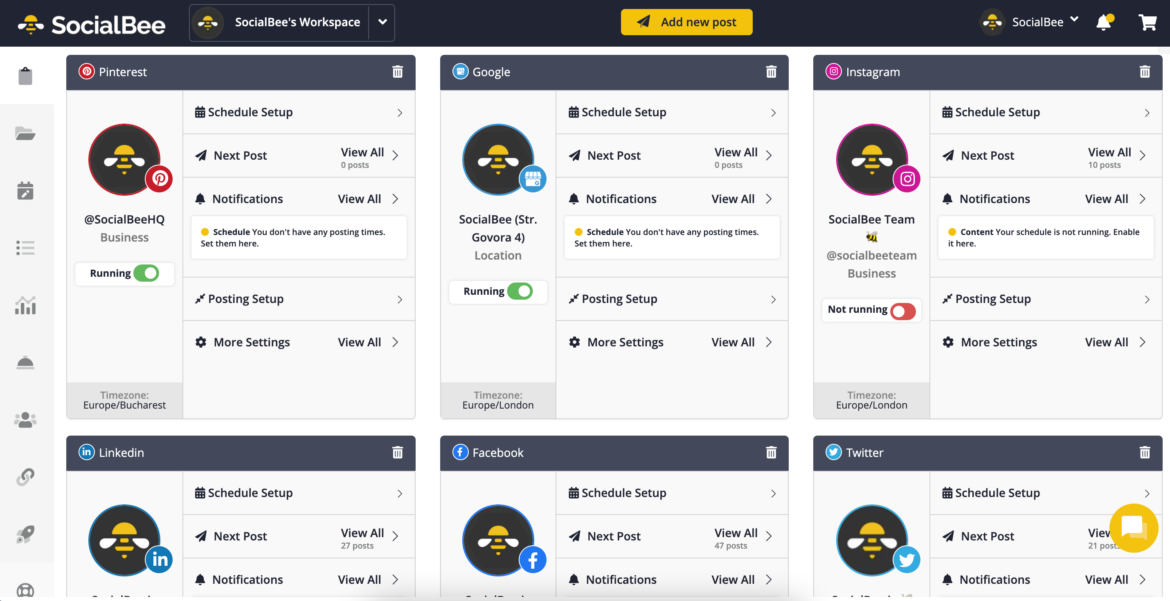
Note that some community platforms like Quora, and Reddit can also help you get more insight from the users of the platforms. Some Facebook groups focused on content marketing have social media managers who share ideas on the best course of action in social media marketing with the ever-changing trends. Use these groups, and ask questions regarding the best social media marketing tools.
By conducting thorough research, you can ensure that you find a tool that not only meets your individual needs but also integrates seamlessly with your current workflow and budget.

Best for small businesses
SocialBee
The easiest way to create content and manage your social media accounts on one Dashboard.
3. CoSchedule

CoSchedule is an all-in-one marketing calendar and social media management tool. It allows you to plan, schedule, and automate social media posts, blog content, and marketing campaigns. CoSchedule offers features like social media analytics, team workflows, content optimization, and integrations with popular platforms like WordPress.

Content Marketing Calendar
CoSchedule
Manage your digital calendar in one place, collaborate with your team and grow your online precense.
4. Hootsuite
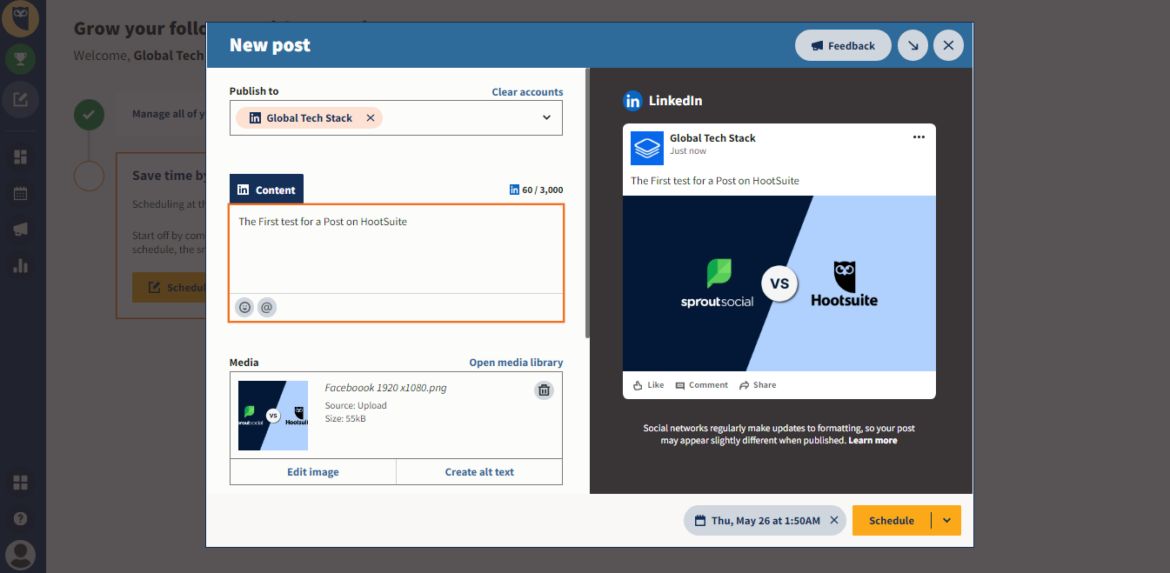
Hootsuite is a widely recognized social media management platform. It allows you to manage multiple social media accounts, schedule posts, engage with your audience, and track analytics. Hootsuite offers comprehensive monitoring and reporting features, team collaboration options, and integrations with popular social media networks.
5. Buffer
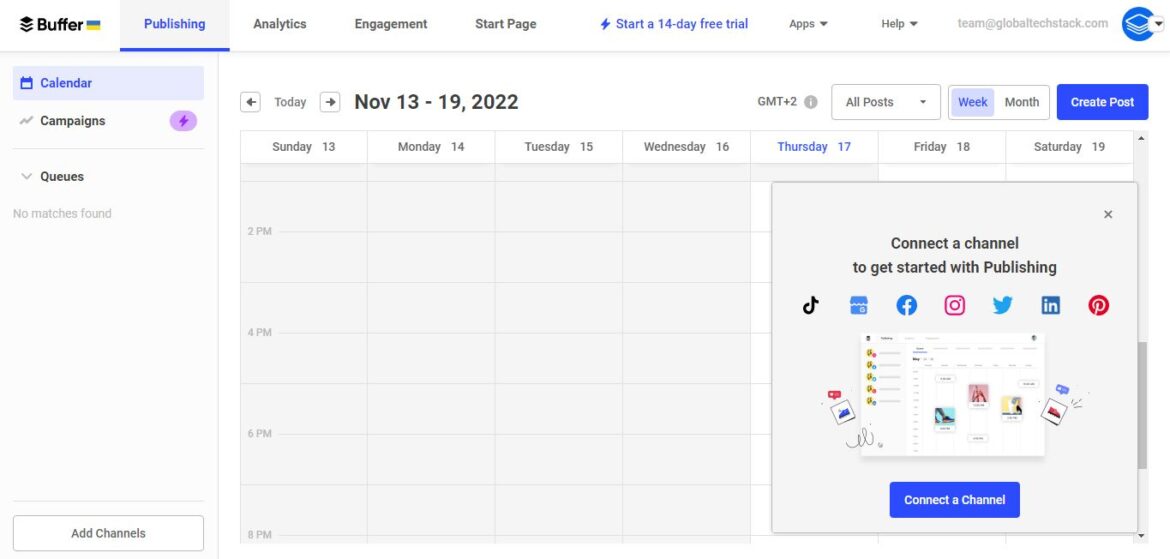
Buffer is a user-friendly tool that enables you to schedule and publish posts across various social media platforms. It provides a clean and intuitive interface, content curation options, social media analytics, and team collaboration features. Buffer also offers a browser extension for easy content sharing.
Remember to explore each tool’s website, features, pricing plans, and customer reviews to determine which one aligns best with your specific business requirements and budget.
When choosing a tool, it’s important to consider your workflow. Some tools may offer more features than others but may not be as user-friendly or efficient when working with a team. For instance, certain tools may require users to create their accounts, while others enable easy logins and posting without the need for account creation. Select a tool that best aligns with your team’s needs and keep your workflow in mind during the selection process.
While considering the features offered by each tool, ensure that the ones on your must-have list are not overlooked due to missing features. A missing feature can hinder your team’s workflow in the future if not addressed properly. Therefore, carefully consider all the features offered by each tool before incorporating them into your social media marketing plan.
5. Test the tools on your shortlist to get a feel of them.
Businesses need to evaluate and test the tools they plan on choosing from. This evaluation process should involve both objective assessment and consideration of personal preferences and concerns. Testing the social media tools in a real-world scenario is vital, and if available, signing up for free trials can provide an opportunity to properly test and trial the tools.
Many platforms on our list of the best social media marketing tools offer free trials and free plans with the likes of CoSchedule. This gives you an idea of what you can archive with these tools. A platform like sprout social which is one of the biggest in the market for both social media agencies and social media managers alike offers longer free trials that can go from 30 days up to 60 days.
Engage team members who will be using the tool, as different individuals may require different features. Gathering feedback from each team member allows for a more accurate assessment of which social media tool would be most beneficial for your business. Create user scenarios and run through potential tasks that are likely to be performed with the social media tool. This process helps in understanding the tool’s functionality, usability, and suitability for your specific requirements.
By evaluating and test-driving the tools on your shortlist, you can make an informed decision and choose the social media management tool that best fits your business needs.
What to consider when evaluating a social media management software
1. User experience (Ease of Using the Tool)
There are many things to consider when evaluating a social media tool. One of the most important factors is user experience. This includes how intuitive the interface is, as well as how easy it is to navigate and interact with the platform.
Additionally, it’s important to take into consideration the team’s experience using the tool – this might include ease of setting up profiles, managing information, creating content, and/or interacting with customers or potential customers. Other considerations may include what devices the tool works on, whether or not it’s optimized for mobile platforms,, and any training that users may need to get started with using the platform effectively.
Ultimately, when considering a social media tool for an organization or individual use-case situation, there should be a careful evaluation of how user-friendly it is; some time investment may need to be dedicated to understanding details about how exactly each feature operates before committing to a purchase or long-term plan.
Ensuring that users can easily learn how to best interact within a platform can ultimately make or break success; as such, taking all of these factors into account during an evaluation process could result in smoother effective implementation later on down the line.
2. Features on the Social Media Management Platform
If you’re looking for a social media management tool that can help streamline your digital marketing efforts, check for features on the social media platforms offer. For instance look for access to tools like hashtag suggestions, first-comment scheduling, and calendar planning tools.
With such tools, it means that it’s easy to find relevant content and hashtags related to your brand and post them at an optimal time each day or week. Scheduling posts in advance frees up more of your time for other important tasks. Its a feature that can keep you focused on improving our social media strategy.
Additionally, look for tools that offer analytics and reporting options so you can better understand what type of activities are driving the most engagement on your posts. These insights will be invaluable in finding new opportunities and forming a lucrative marketing strategy over time.
What Features Should I Look for in a Social Media Management Tool?
When selecting the right social media management tool, there are a few key features to consider. Firstly, you should look for a platform that provides an intuitive user interface and design that is easy to navigate. This will enable your team to quickly find the features they need without having to spend unnecessary time learning how to use the system.
You should also consider any add-on features that are a must-have to run successful social media campaigns. Here are the features to look for in a social media management software platform.
Social Media Monitoring and Listening
Social media has become an increasingly powerful tool to connect people and share information. As such, businesses need to pay attention to the conversations going on around their brand or products. Social media monitoring and listening is the process of keeping track of these conversations. By using this method, companies can gain an understanding of how customers feel about their product or service and also recognize potential opportunities for promotion or engagement.
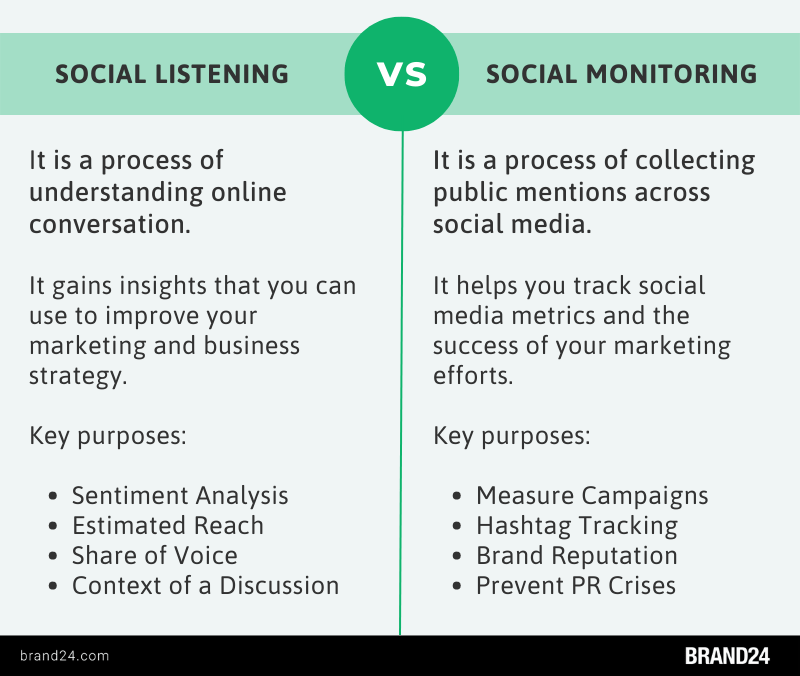
Image source: Brand24
With social media monitoring and listening, businesses can keep track of what people are saying about them online—from what they like best about their product to how it compares to competitors’ offerings.
It also allows you to discover new target markets that could be interested in their product, measure customer sentiment towards brands they’re associated with, research competitors’ strategies, see how well advertisements are performing, and even diagnose any customer service issues that may arise throughout the business.
Additionally, by monitoring relevant hashtags associated with companies’ products or services, firms can join relevant conversations around those topics where appropriate. All these elements help a company better respond to customer queries and provide more tailored content regarding marketing strategy.
Analytics and Reporting
Analytics and reporting are essential parts of tracking the success of your social media campaigns. With a quality social media tool, you should be able to extract detailed reports that provide insight into the data that’s been collected over a given timeframe. Reports that can be generated include engagement levels, the success of competitor campaigns, successful individual posts, and more.
Using these reports, you and your team can make informed decisions on how best to optimize your social media presence to maximize its reach and impact. Scalable reporting options are especially helpful for agencies with multiple clients.
By providing quick reporting and analytics directly from your chosen social media tool, you can easily share relevant information with clients in an efficient way. Taking advantage of these features will help ensure smart decisions about your social media strategy now and in the future.
Social Media Engagement
Social engagement is one of the most important aspects of a successful relationship with followers and potential customers. This type of engagement is an ongoing two-way conversation, which can be done online through social media platforms such as Twitter, Facebook, Instagram, and LinkedIn.
Through this digital direct dialogue companies can humanize their brand by listening and responding to customers’ needs in real time. Having active participation on various social media outlets creates more opportunities for customer retention and loyalty; it yields a better chance for businesses to listen and respond personally to questions or complaints posed by these platforms.
A great social media tool will allow you to quickly identify these engaging opportunities with your customers or potential customers so can respond promptly and effectively. Companies should search for solutions that offer automated monitoring tools, efficient filtering capabilities, and tailored analytics. All these enable you to keep track of conversations concerning your business while identifying potential new clients and recognizing current ones who are loyal fans.
By using an appropriate social media tool, companies can maximize efficiency in managing interactions across multiple channels, creating an outstanding basis for truly connecting with their target audience.
Social Media Channel Integration
Having the ability to access and manage social media channels with one tool is essential for managing a successful online presence. Being able to integrate multiple platforms into a single dashboard ensures that businesses can be more efficient in their communication, time management, and overall brand strategy.
Integrating with major social networks such as Facebook, Twitter, Instagram, and news, allows businesses to continue developing ways to interact with current customers, engage potential consumers, and stay on top of industry trends.
With the help of streamlined integration of social networks through a single platform, businesses can create real-time updates in response to customer requests or inquiries. Additionally always staying connected from one place increases productivity as they can utilize to track engagement across multiple networks in one place that simplifies outreach and analyzing results. In this way, businesses are better able to identify what content resonates best with audiences across all their channels.
From deriving insights about keywords or identifying content-related trends, having a compound view of your different social media accounts is key for long-term success.
Social Media Post Scheduling
Social post scheduling is becoming an increasingly important tool for any social media manager or digital marketer, as it can help to save time and maximize the reach of posts.
Scheduling social media content ahead of time allows marketers to plan and organize campaigns more efficiently, ensuring that their social media strategy is cohesive and effective. It also provides the opportunity to evaluate analytics after a post has gone live, allowing for better insights into audience engagement levels over time.
Having a post-scheduling system in place eliminates the requirement for manual posting at specific times of the day, freeing up resources that can be better spent on other tasks such as creating creative content or engaging with followers.
Making sure posts are regularly updated throughout the day, it helps keep followers engaged and interested in your brand’s offerings. It also means you don’t have to worry about forgetting to publish content due to lack of time or unforeseen circumstances – with a scheduling system in place, all you need to do is set aside sometime each week and everything will be taken care of automatically.
Social Alerts
Alerts are an important feature when it comes to managing customer service promptly and efficiently. They can inform you of sudden changes in the dialogue surrounding your business or brand, or even alert you to potential emergencies.
For example, a spike in user-generated content can signal that customers may have raised questions or complaints that need addressing as soon as possible. Similarly, if an online company receives physical threats, alerts can allow them to take proactive steps and ensure the safety of its staff and customers.
Beyond this, alerts also provide useful information for understanding what topics and trends are currently resonating with customers. Being able to quickly respond means that customer service teams have more opportunities to build relationships with their customers on a personal level.
They are better informed about how current events are impacting people’s lives and can demonstrate empathy accordingly. This understanding helps contribute to positive customer experiences overall, ultimately leading to deeper loyalty and improved brand sentiment.
3. Customer support
Dealing with customer support issues can be a bit of a challenge, especially when using a new social media tool. To ensure that customers can get the help they need quickly and easily, many companies offer comprehensive training for customers. This is usually done through tutorials online or in person so that users can understand how to use the tool and its features effectively.
Customer response time and available customer support channels are also important facets of providing high-quality customer service. Companies should make sure they are available on multiple communication platforms such as online chat, phone, or email so that customers can quickly find a resolution to their issues without delay.
Additionally, reviews from sites like Trustpilot give potential customers insight into how helpful the customer service team is for existing users. Last but not least, we would like to quickly shout out to our amazing customer success hero Isabel who has been instrumental in helping our customers transition successfully to our new social media tool.
4. Team collaboration tools
Effective team collaboration is essential for the success of managing social media accounts. The tool needs to support smooth workflow among multiple team members working on the same accounts to ensure consistency and productivity. Team collaboration tools should enable efficient communication within the team, facilitate task management, organize documentation easily, track progress, and provide an overall reliable platform for teams to collaborate seamlessly.
Using such a tool effectively will enable members of the team to assign tasks quickly, monitor progress consistently with project dashboards and reporting, log customer interactions as well as respond to queries promptly. Not only that but user access can also be limited so that sensitive information is shared only with certain employees within the team.
It eliminates inefficient processes and increases efficiency among staff while creating a centralized repository of communications and records providing an accurate picture of the work done by each collaborator. This helps everyone stay informed on how their efforts contribute to the company’s social media goals.
5. Supported social media platforms
With so many social media platforms available today, it is important to ensure that the platform you select can provide you with the features you require to effectively manage your business’s presence.
This could include scheduling posts in advance and tracking analytics on how well your content is performing. Some platforms like Sprout Social simplify this process by offering support for the four main platforms: Instagram, Facebook (and its messenger platform including WhatsApp), LinkedIn, and Twitter. In addition, new platforms such as TikTok, YouTube, Google my business messages, and Pinterest are coming very soon to give businesses even more options. You can connect your social media profiles on the free trial and start making use of its social media management features.
The benefit of using one platform as opposed to several ones is that it allows your team members to collaborate easily in a single space. This can help streamline communication and make sure everyone stays up-to-date with the latest developments in your social media campaigns.
Additionally, having all relevant information in one spot makes it much easier to analyze how well things are working out and quickly adjust their approach if needed. Most platforms support social media posts and analytics for the major players in the social media space. The newer arrivals like Tik Tok be difficult to find on these platforms.
6. Pricing
Pricing for social media management tools can vary widely depending on the features and platforms included. If you find a great tool that matches your needs, make sure to check what features are free and if the paid options include the items on your must-have list.
It’s sometimes possible to get an annual deal that may cost less than a month-to-month subscription plan. Sprout Social offers a 30 day-day free trial with no hidden costs such as setup fees or cancellation charges. This gives you access to the platform to use on any plan with no credit card needed to register.
Depending on your goals and budgets for running an effective social media campaign, it will be important to consider your range of options before committing to a specific tool. Only use what you need – as many tools out there offer various subscription plans of escalated tiers with increasingly more elaborate features (and bigger prices).
And always keep in mind the long image of cost savings by choosing one that suits your company’s unique marketing needs, rather than aiming solely for low upfront costs each month without considering future outcomes enough.
7. Scalability of the social media management tool
When it comes to social media marketing tools, scale is an important factor to consider. As your business grows and your needs evolve, you may need to add additional people and social profiles to the tool. Does the social media marketing tool charge per user or offer a flat rate? This is an important question as it allows you to plan financially for future purchases and expansions. Depending on the size of your client base, there are likely different costs associated with users and profiles from month-to-month.
Larger customer bases may require separate fees for each user in addition to any extra services that require additional data points or usage. As the number of users on a tool grows, it might make sense to switch from a per-user rate to a flat rate fee that can accommodate the new number of users. Knowing how much it will cost as you adjust and expand is key in figuring out how long it will take for these changes to be beneficial and profitable for your company.
The cost-related scale of a social media marketing tool should be constantly monitored to ensure the best possible reception from customers using the tool while making sure financial goals are being achieved by covering all costs associated with increased usage or added features. Calculations should include costs related not only to the user count but also to monthly fees associated with each additional service.
Choose the Best Social Media Management Tool for your Business
Social media management tools can be a great way for businesses of all sizes to streamline their communication and make sure everyone stays up-to-date with the latest developments in their campaigns.
It is important to consider features, pricing, scalability, and other factors when choosing the best tool for your business. Doing your research and understanding what you need to get the best out of a tool is key in optimizing the value of any social media management tool for your company. When choosing a social media management solution, always make sure it can allow you to distribute your social media content better and you can monitor your social media performance across all your social accounts in one place using social tools’ analytics features.
Now that you’ve got an idea of what features to look for in a social media management tool, let’s talk about how to make sure it will be useful for your business. It’s important to consider how the tool can be u
Social media management platforms are an essential part of any successful marketing strategy. With the right tool, social media professionals can quickly create, monitor, and track posts across numerous channels while gaining valuable insights into how customers interact with their brands. It’s also important to consider the total cost of ownership when selecting a platform. The best tools offer free trials or low start-up costs so that businesses can determine whether or not they’re worth investing in.
Social media is a powerful tool for both individuals and businesses, used to not only reach out to peers but also increase awareness. As of 2023, there are over 4.89 billion social media users globally according to Sprout Social. This means that businesses have more and more opportunities than ever before to connect with potential customers. To do this with ease businesses need the right social media management tools.

Before committing to a social media platform, it’s important to know exactly what features you need for your business: automation tools to save time on routine tasks and monitoring capabilities to keep tabs on competitors and industry trends.
You should also look for flexible analytics solutions that allow you to measure ROI and growth over time so that you can adjust your strategies as needed. Finally, always make sure to choose a platform with reliable customer service so you can get help if something isn’t working properly or if you have any technical questions.
It can be difficult for businesses to identify the best social media management tool, especially with the countless options available online. Each tool offers different features and functionalities, so business owners need to assess what their needs are to make a well-informed decision.
In this post, we explore the steps you can take to ensure you choose the best social media marketing tool for you.
What are Social Media Management Tools?
Social media management tools are a powerful asset to businesses and organizations of all sizes. Automating communication and scheduling posts from a single dashboard enables social media managers to efficiently engage with their audiences on various platforms. By analyzing gathered metrics, they can monitor campaign performance and make strategic adjustments for improved return on investment.
More so, social media management tools provide actionable insights from detailed analytics about user engagement. This data includes demographics, which allow users to understand who is engaging with their content; helpful when wanting to expand your reach. With competitive analysis to compare performance against industry peers, users can gauge the success of their efforts with others in the same field.
Smart scheduling ensures that posts are reaching followers at optimal times for higher visibility and engagement. Social media management tools put further control, convenience, and insights into the hands of digital marketers around the world – helping them develop better strategies with greater efficiency.
Why use Social Media Management Tools for your Businesses
Social media management tools are essential for businesses in every industry today since social media has become a powerful communication platform. With these tools, businesses can easily track conversations about their brand and respond to customers in real time.
Companies can also use these tools to schedule posts in advance so they don’t have to worry about missing an important post due to being away from the computer or without access to the internet for a short period. This way, brands can ensure that they are regularly promoting content and staying active on the most popular social networks.
Social media management tools also provide companies with useful data and insights that they can use to improve their marketing strategy and better understand how users engage with their brand. For example, you can track engagement rates, comments, shares, likes, followers, and much more with these tools.
It’s easier for companies to launch new social media campaigns if they use social media management software. This is because it allows them to capture more attention by targeting specific people within their target market.
Using such tools gives businesses a great advantage as it enables them to create unique relationships with customers while effectively engaging in conversations surrounding their business on social media.
By utilizing consistent engagement, targeted advertising, and retargeting strategies, your brand can remain at the forefront of the minds of individuals who are making purchasing decisions. Regardless of your professional field, a top-tier social media management tool is essential for effective digital marketing.
Although social media can bring numerous advantages to your business, certain difficulties come with it. Social media marketing encompasses various tasks such as content creation, customer engagement, data analysis, reporting, and measuring return on investment. Various social media platforms exist today. It is common for businesses to have a presence on multiple platforms, sometimes exceeding five.
The manual management of various social network processes can be both complex and time-consuming.
How do you find the best social media management tool for your business?
1. Start by defining your social media goals
Before you start looking for a social media management tool, you need to clearly define your goals and objectives.
- What do you want to achieve through social media?
- Do you want to build relationships with customers, generate leads, or increase brand awareness?
- What do need a social media tool to help you with?
- Do you need one?
Use the SMART goals goal-setting model when you set your social media goals. Set goals that are specific, measurable, attainable, relevant, and time-bound. Use this template from Fine Media to set your SMART goals.
Identifying your goals can assist in the process of selecting appropriate tools for social media management.
Before you start looking for a social media management tool, it’s crucial to clearly define your goals and objectives. This step helps you understand what you want to achieve through social media and guides your tool selection process.
For example, you may aim to build relationships with customers, generate leads, increase brand awareness, or drive website traffic. Specify how many leads you want to generate at what time. By identifying your specific objectives, you can narrow down the list of potential tools that align with your goals.
2. Decide on your must-have features
To create a successful social media marketing strategy, you need to identify your must-have features in a management tool. Consider which features will help you meet the objectives you set in your social media goals. While many marketing tools offer similar features, it’s important to focus on the ones that are essential for your specific goals.
During this process, involve key members of your team and gather their input on which features they need. By considering different perspectives, you can ensure that no crucial features are overlooked. Also, break down the activities required for each goal into smaller tasks that can be accomplished using specific tools or features. Once you’ve identified these tasks, you can explore different software programs and assess whether they include the must-have features you need to reach your goals.
While features may be useful for future campaigns, prioritize identifying all the essential features necessary for executing your strategy effectively right now. Keeping these details in mind will help ensure long-term success with your social media marketing efforts.
I cover this in detail further down the blog to give you a much clearer picture of the feature to look for in a social media platform depending on what you would like to achieve.
3. Do research to find the best platform options
When searching for the best social media management tool for your needs, conducting research is crucial. Start by clarifying your goals and listing out the must-have features you identified in the previous steps. To find relevant options, use keywords such as “best social media marketing tools,” “top social media management tools,” “social media management software,” and “top social media tools” in your online search.

You can also leverage search engines like Google and platforms like YouTube to gather more information on different solutions. Reading reviews and comparisons between various tools can provide insights into how well each option works. It’s important to allocate enough time to thoroughly investigate these platforms before making any decisions. We have compared some of the best social media marketing platforms also to make choosing easier for you, make sure to check the article out.

Note that some community platforms like Quora, and Reddit can also help you get more insight from the users of the platforms. Some Facebook groups focused on content marketing have social media managers who share ideas on the best course of action in social media marketing with the ever-changing trends. Use these groups, and ask questions regarding the best social media marketing tools.
By conducting thorough research, you can ensure that you find a tool that not only meets your individual needs but also integrates seamlessly with your current workflow and budget.
4. Create your shortlist of social media tools
In the realm of social media marketing, numerous tools offer a wide range of benefits and features. To have a successful social media campaign, selecting the right tool is essential.
Below is a list of several top tools with brief descriptions of their features:
1. Sprout Social

Sprout Social is a robust social media management tool that offers features like scheduling and publishing posts, monitoring brand mentions, managing social media interactions, and analyzing performance. It provides in-depth reporting, audience targeting, CRM integration, and team collaboration features.

No credit card required.
Sprout Social
The easiest website builder for beginners and small businesses.
2. SocialBee

Note that some community platforms like Quora, and Reddit can also help you get more insight from the users of the platforms. Some Facebook groups focused on content marketing have social media managers who share ideas on the best course of action in social media marketing with the ever-changing trends. Use these groups, and ask questions regarding the best social media marketing tools.
By conducting thorough research, you can ensure that you find a tool that not only meets your individual needs but also integrates seamlessly with your current workflow and budget.

Best for small businesses
SocialBee
The easiest way to create content and manage your social media accounts on one Dashboard.
3. CoSchedule

CoSchedule is an all-in-one marketing calendar and social media management tool. It allows you to plan, schedule, and automate social media posts, blog content, and marketing campaigns. CoSchedule offers features like social media analytics, team workflows, content optimization, and integrations with popular platforms like WordPress.

Content Marketing Calendar
CoSchedule
Manage your digital calendar in one place, collaborate with your team and grow your online precense.
4. Hootsuite

Hootsuite is a widely recognized social media management platform. It allows you to manage multiple social media accounts, schedule posts, engage with your audience, and track analytics. Hootsuite offers comprehensive monitoring and reporting features, team collaboration options, and integrations with popular social media networks.
5. Buffer

Buffer is a user-friendly tool that enables you to schedule and publish posts across various social media platforms. It provides a clean and intuitive interface, content curation options, social media analytics, and team collaboration features. Buffer also offers a browser extension for easy content sharing.
Remember to explore each tool’s website, features, pricing plans, and customer reviews to determine which one aligns best with your specific business requirements and budget.
When choosing a tool, it’s important to consider your workflow. Some tools may offer more features than others but may not be as user-friendly or efficient when working with a team. For instance, certain tools may require users to create their accounts, while others enable easy logins and posting without the need for account creation. Select a tool that best aligns with your team’s needs and keep your workflow in mind during the selection process.
While considering the features offered by each tool, ensure that the ones on your must-have list are not overlooked due to missing features. A missing feature can hinder your team’s workflow in the future if not addressed properly. Therefore, carefully consider all the features offered by each tool before incorporating them into your social media marketing plan.
5. Test the tools on your shortlist to get a feel of them.
Businesses need to evaluate and test the tools they plan on choosing from. This evaluation process should involve both objective assessment and consideration of personal preferences and concerns. Testing the social media tools in a real-world scenario is vital, and if available, signing up for free trials can provide an opportunity to properly test and trial the tools.
Many platforms on our list of the best social media marketing tools offer free trials and free plans with the likes of CoSchedule. This gives you an idea of what you can archive with these tools. A platform like sprout social which is one of the biggest in the market for both social media agencies and social media managers alike offers longer free trials that can go from 30 days up to 60 days.
Engage team members who will be using the tool, as different individuals may require different features. Gathering feedback from each team member allows for a more accurate assessment of which social media tool would be most beneficial for your business. Create user scenarios and run through potential tasks that are likely to be performed with the social media tool. This process helps in understanding the tool’s functionality, usability, and suitability for your specific requirements.
By evaluating and test-driving the tools on your shortlist, you can make an informed decision and choose the social media management tool that best fits your business needs.
What to consider when evaluating a social media management software
1. User experience (Ease of Using the Tool)
There are many things to consider when evaluating a social media tool. One of the most important factors is user experience. This includes how intuitive the interface is, as well as how easy it is to navigate and interact with the platform.
Additionally, it’s important to take into consideration the team’s experience using the tool – this might include ease of setting up profiles, managing information, creating content, and/or interacting with customers or potential customers. Other considerations may include what devices the tool works on, whether or not it’s optimized for mobile platforms,, and any training that users may need to get started with using the platform effectively.
Ultimately, when considering a social media tool for an organization or individual use-case situation, there should be a careful evaluation of how user-friendly it is; some time investment may need to be dedicated to understanding details about how exactly each feature operates before committing to a purchase or long-term plan.
Ensuring that users can easily learn how to best interact within a platform can ultimately make or break success; as such, taking all of these factors into account during an evaluation process could result in smoother effective implementation later on down the line.
2. Features on the Social Media Management Platform
If you’re looking for a social media management tool that can help streamline your digital marketing efforts, check for features on the social media platforms offer. For instance look for access to tools like hashtag suggestions, first-comment scheduling, and calendar planning tools.
With such tools, it means that it’s easy to find relevant content and hashtags related to your brand and post them at an optimal time each day or week. Scheduling posts in advance frees up more of your time for other important tasks. Its a feature that can keep you focused on improving our social media strategy.
Additionally, look for tools that offer analytics and reporting options so you can better understand what type of activities are driving the most engagement on your posts. These insights will be invaluable in finding new opportunities and forming a lucrative marketing strategy over time.
What Features Should I Look for in a Social Media Management Tool?
When selecting the right social media management tool, there are a few key features to consider. Firstly, you should look for a platform that provides an intuitive user interface and design that is easy to navigate. This will enable your team to quickly find the features they need without having to spend unnecessary time learning how to use the system.
You should also consider any add-on features that are a must-have to run successful social media campaigns. Here are the features to look for in a social media management software platform.
Social Media Monitoring and Listening
Social media has become an increasingly powerful tool to connect people and share information. As such, businesses need to pay attention to the conversations going on around their brand or products. Social media monitoring and listening is the process of keeping track of these conversations. By using this method, companies can gain an understanding of how customers feel about their product or service and also recognize potential opportunities for promotion or engagement.

Image source: Brand24
With social media monitoring and listening, businesses can keep track of what people are saying about them online—from what they like best about their product to how it compares to competitors’ offerings.
It also allows you to discover new target markets that could be interested in their product, measure customer sentiment towards brands they’re associated with, research competitors’ strategies, see how well advertisements are performing, and even diagnose any customer service issues that may arise throughout the business.
Additionally, by monitoring relevant hashtags associated with companies’ products or services, firms can join relevant conversations around those topics where appropriate. All these elements help a company better respond to customer queries and provide more tailored content regarding marketing strategy.
Analytics and Reporting
Analytics and reporting are essential parts of tracking the success of your social media campaigns. With a quality social media tool, you should be able to extract detailed reports that provide insight into the data that’s been collected over a given timeframe. Reports that can be generated include engagement levels, the success of competitor campaigns, successful individual posts, and more.
Using these reports, you and your team can make informed decisions on how best to optimize your social media presence to maximize its reach and impact. Scalable reporting options are especially helpful for agencies with multiple clients.
By providing quick reporting and analytics directly from your chosen social media tool, you can easily share relevant information with clients in an efficient way. Taking advantage of these features will help ensure smart decisions about your social media strategy now and in the future.
Social Media Engagement
Social engagement is one of the most important aspects of a successful relationship with followers and potential customers. This type of engagement is an ongoing two-way conversation, which can be done online through social media platforms such as Twitter, Facebook, Instagram, and LinkedIn.
Through this digital direct dialogue companies can humanize their brand by listening and responding to customers’ needs in real time. Having active participation on various social media outlets creates more opportunities for customer retention and loyalty; it yields a better chance for businesses to listen and respond personally to questions or complaints posed by these platforms.
A great social media tool will allow you to quickly identify these engaging opportunities with your customers or potential customers so can respond promptly and effectively. Companies should search for solutions that offer automated monitoring tools, efficient filtering capabilities, and tailored analytics. All these enable you to keep track of conversations concerning your business while identifying potential new clients and recognizing current ones who are loyal fans.
By using an appropriate social media tool, companies can maximize efficiency in managing interactions across multiple channels, creating an outstanding basis for truly connecting with their target audience.
Social Media Channel Integration
Having the ability to access and manage social media channels with one tool is essential for managing a successful online presence. Being able to integrate multiple platforms into a single dashboard ensures that businesses can be more efficient in their communication, time management, and overall brand strategy.
Integrating with major social networks such as Facebook, Twitter, Instagram, and news, allows businesses to continue developing ways to interact with current customers, engage potential consumers, and stay on top of industry trends.
With the help of streamlined integration of social networks through a single platform, businesses can create real-time updates in response to customer requests or inquiries. Additionally always staying connected from one place increases productivity as they can utilize to track engagement across multiple networks in one place that simplifies outreach and analyzing results. In this way, businesses are better able to identify what content resonates best with audiences across all their channels.
From deriving insights about keywords or identifying content-related trends, having a compound view of your different social media accounts is key for long-term success.
Social Media Post Scheduling
Social post scheduling is becoming an increasingly important tool for any social media manager or digital marketer, as it can help to save time and maximize the reach of posts.
Scheduling social media content ahead of time allows marketers to plan and organize campaigns more efficiently, ensuring that their social media strategy is cohesive and effective. It also provides the opportunity to evaluate analytics after a post has gone live, allowing for better insights into audience engagement levels over time.
Having a post-scheduling system in place eliminates the requirement for manual posting at specific times of the day, freeing up resources that can be better spent on other tasks such as creating creative content or engaging with followers.
Making sure posts are regularly updated throughout the day, it helps keep followers engaged and interested in your brand’s offerings. It also means you don’t have to worry about forgetting to publish content due to lack of time or unforeseen circumstances – with a scheduling system in place, all you need to do is set aside sometime each week and everything will be taken care of automatically.
Social Alerts
Alerts are an important feature when it comes to managing customer service promptly and efficiently. They can inform you of sudden changes in the dialogue surrounding your business or brand, or even alert you to potential emergencies.
For example, a spike in user-generated content can signal that customers may have raised questions or complaints that need addressing as soon as possible. Similarly, if an online company receives physical threats, alerts can allow them to take proactive steps and ensure the safety of its staff and customers.
Beyond this, alerts also provide useful information for understanding what topics and trends are currently resonating with customers. Being able to quickly respond means that customer service teams have more opportunities to build relationships with their customers on a personal level.
They are better informed about how current events are impacting people’s lives and can demonstrate empathy accordingly. This understanding helps contribute to positive customer experiences overall, ultimately leading to deeper loyalty and improved brand sentiment.
3. Customer support
Dealing with customer support issues can be a bit of a challenge, especially when using a new social media tool. To ensure that customers can get the help they need quickly and easily, many companies offer comprehensive training for customers. This is usually done through tutorials online or in person so that users can understand how to use the tool and its features effectively.
Customer response time and available customer support channels are also important facets of providing high-quality customer service. Companies should make sure they are available on multiple communication platforms such as online chat, phone, or email so that customers can quickly find a resolution to their issues without delay.
Additionally, reviews from sites like Trustpilot give potential customers insight into how helpful the customer service team is for existing users. Last but not least, we would like to quickly shout out to our amazing customer success hero Isabel who has been instrumental in helping our customers transition successfully to our new social media tool.
4. Team collaboration tools
Effective team collaboration is essential for the success of managing social media accounts. The tool needs to support smooth workflow among multiple team members working on the same accounts to ensure consistency and productivity. Team collaboration tools should enable efficient communication within the team, facilitate task management, organize documentation easily, track progress, and provide an overall reliable platform for teams to collaborate seamlessly.
Using such a tool effectively will enable members of the team to assign tasks quickly, monitor progress consistently with project dashboards and reporting, log customer interactions as well as respond to queries promptly. Not only that but user access can also be limited so that sensitive information is shared only with certain employees within the team.
It eliminates inefficient processes and increases efficiency among staff while creating a centralized repository of communications and records providing an accurate picture of the work done by each collaborator. This helps everyone stay informed on how their efforts contribute to the company’s social media goals.
5. Supported social media platforms
With so many social media platforms available today, it is important to ensure that the platform you select can provide you with the features you require to effectively manage your business’s presence.
This could include scheduling posts in advance and tracking analytics on how well your content is performing. Some platforms like Sprout Social simplify this process by offering support for the four main platforms: Instagram, Facebook (and its messenger platform including WhatsApp), LinkedIn, and Twitter. In addition, new platforms such as TikTok, YouTube, Google my business messages, and Pinterest are coming very soon to give businesses even more options. You can connect your social media profiles on the free trial and start making use of its social media management features.
The benefit of using one platform as opposed to several ones is that it allows your team members to collaborate easily in a single space. This can help streamline communication and make sure everyone stays up-to-date with the latest developments in your social media campaigns.
Additionally, having all relevant information in one spot makes it much easier to analyze how well things are working out and quickly adjust their approach if needed. Most platforms support social media posts and analytics for the major players in the social media space. The newer arrivals like Tik Tok be difficult to find on these platforms.
6. Pricing
Pricing for social media management tools can vary widely depending on the features and platforms included. If you find a great tool that matches your needs, make sure to check what features are free and if the paid options include the items on your must-have list.
It’s sometimes possible to get an annual deal that may cost less than a month-to-month subscription plan. Sprout Social offers a 30 day-day free trial with no hidden costs such as setup fees or cancellation charges. This gives you access to the platform to use on any plan with no credit card needed to register.
Depending on your goals and budgets for running an effective social media campaign, it will be important to consider your range of options before committing to a specific tool. Only use what you need – as many tools out there offer various subscription plans of escalated tiers with increasingly more elaborate features (and bigger prices).
And always keep in mind the long image of cost savings by choosing one that suits your company’s unique marketing needs, rather than aiming solely for low upfront costs each month without considering future outcomes enough.
7. Scalability of the social media management tool
When it comes to social media marketing tools, scale is an important factor to consider. As your business grows and your needs evolve, you may need to add additional people and social profiles to the tool. Does the social media marketing tool charge per user or offer a flat rate? This is an important question as it allows you to plan financially for future purchases and expansions. Depending on the size of your client base, there are likely different costs associated with users and profiles from month-to-month.
Larger customer bases may require separate fees for each user in addition to any extra services that require additional data points or usage. As the number of users on a tool grows, it might make sense to switch from a per-user rate to a flat rate fee that can accommodate the new number of users. Knowing how much it will cost as you adjust and expand is key in figuring out how long it will take for these changes to be beneficial and profitable for your company.
The cost-related scale of a social media marketing tool should be constantly monitored to ensure the best possible reception from customers using the tool while making sure financial goals are being achieved by covering all costs associated with increased usage or added features. Calculations should include costs related not only to the user count but also to monthly fees associated with each additional service.
Choose the Best Social Media Management Tool for your Business
Social media management tools can be a great way for businesses of all sizes to streamline their communication and make sure everyone stays up-to-date with the latest developments in their campaigns.
It is important to consider features, pricing, scalability, and other factors when choosing the best tool for your business. Doing your research and understanding what you need to get the best out of a tool is key in optimizing the value of any social media management tool for your company. When choosing a social media management solution, always make sure it can allow you to distribute your social media content better and you can monitor your social media performance across all your social accounts in one place using social tools’ analytics features.
Now that you’ve got an idea of what features to look for in a social media management tool, let’s talk about how to make sure it will be useful for your business. It’s important to consider how the tool can be utilized across different platforms, as well as how efficiently data can be collected and analyzed.
Take the time to evaluate the effectiveness of the tool, its compatibility with your current systems, and how it can be used to reduce costs in the long term.
tilized across different platforms, as well as how efficiently data can be collected and analyzed.
Take the time to evaluate the effectiveness of the tool, its compatibility with your current systems, and how it can be used to reduce costs in the long term.





